The origins of Zeek Rewards: A 125% ROI guaranteed

Ever since Zeek Rewards hired a bunch of lawyers to pursuit ensuring compliance within the company, much blame has been directed by the company at its members.
Troy Dooly over at MLM Helpdesk and credited at the last Zeek Rewards “Red Carpet” event last week as a”training consultant” even went so far as to state a few weeks back that it wasn’t Zeek Rewards or their business model that would make or break the company, but rather its members.
This was in response to Zeek Rewards members running around singing the praises of the daily returns they were earning on their investments with the company.
Aside from an investment scheme being the simplest way to explain how affiliates earn money with Zeek Rewards, today we go one step further and analyse where this initial concept came from.
It’s well-known that Zeek Rewards initially launched guaranteeing a 125% ROI on all money invested into the company by members (or customers they convinced to purchase bids), with members having to do nothing more than submit a daily classified ad.
Following changes to this model in mid-2011, Zeek Rewards systematically began eliminating all evidence of this initial business model and these days not much is left showcasing the origins of the Zeek Rewards business opportunity or how it was marketed.
I’ve touched on this topic briefly in the past but never before have I had anything that portrays in such detail how Zeek Rewards initially marketed themselves prior to their 2011 launch.

Our source material for the following analysis comes from none other than Zeek Rewards itself and is a marketing call hosted by Zeek Rewards’ Sales Director, Darryl Douglas (photo right).
The training call is available to listen to in full at the end of this article and all timestamps included hereafter can be manually tracked to when listening to the call for verification.
For reference, the call was hosted by Douglas on the 26th of January 2011, with Zeek Rewards having just launched their “compounder” compensation plan on January 21st, six days prior.
On the call Douglas introduces himself as living in Orange County, California and being cousins of singers Brandy and Ray J. He also claims to have ten years experience in the network marketing industry quoting his last downline (organisation) as being made up of “four million people”.
After initially going on about traffic and Zeekler’s penny auctions, the real meat of the call is discussed – that being Zeek Rewards’ “compounder” compensation plan and how affiliates earn money.
[10:03] (You) log into your backoffice, you’ve already written all the ads (well, the company has), I choose one of them, and then I choose one of the places you suggest we run the ad, I place my ad there, I’m done, I go back to the back office and let you guys know I’ve placed my ad, and tonight I earn a pay-day.
This is every 24 hours.
[11:02] Zeekler has created Zeek Rewards. Why? So we can introduce the compounder.
Back when everyone wasn’t pretending Zeek Rewards wasn’t an investment opportunity, their compensation plan was called the “compounder” and revolved around affiliates purchasing “compounding bids”, earning a daily return and re-investing in more compounding bids. For each compounding bid purchased, Zeek Rewards guaranteed a 125% ROI on the purchase price paid, frequently quoting an average return of 2% a day.
[1:13] Each day profits are generated and you earn a pay-day. Can you imagine getting paid seven days a week starting today? Yes I did say starting today.
That’s exactly the potential we’re going to empower you with, with our new and incredible compensation called the 24 hour compounder.
We’re the only place on the internet that we know of, that has this 24 hour compounder rewards system.
As is the case today, whether the bids were used or not was inconsequential with the company guaranteeing a 125% ROI regardless.
[18:20] Let me give you an example of how the compounder works. It doesn’t matter whether you have 10 credits, a hundred credits, a thousand credits – it all works the exact same way.
So let’s assume just for the sake of this example to show you how this thing can create literally three thousand, four thousand, five thousand dollars a month PASSIVELY.
It (the “compounder”) can do a whole lot more than that. This thing can do that in a week, this thing can do that every day, this thing can do a lot more than that every day.
So let me show you how you can get to somewhere in the range of $3000 a month passively.
The bigger we get the more what we have? Profits. The more profits we have, who do we pay more? You.
Crazy isn’t it?
Let’s say for the sake of this example, at the end of the day, the company was able to pay, reimburse 2% across the board to every single member. Let’s say you got 500 credits in your
account. That would mean in your first 24 hours overnight, you generate $10.Why?
Because 2% of 500 is $10 bucks. Well because of the compounded, you take the dollars that you generated in those 24 hours and you compound them into new bid purchases.
Watch what happens in day 2, because remember this is a compounder. Day 2 you don’t have 500, you have 510.
Why? Because the compounder compounded you overnight and rewarded you an income of 2%.
Let’s say it does it again the next day. Now you don’t have 510, you have 510 plus, let’s say it does it again the next day, you don’t have that it’s gotten bigger, the next day it’s gotten bigger still, the next day bigger, bigger, bigger, bigger, bigger, bigger every single day.
When you get to the point of generating between 4 or 5 hundred bucks a day (this is crazy isn’t it? Crazy isn’t it?), when you’re generating that kind of income, and we’ve got people close to doing that in 6 – just, and this is insane, 6 days, when you get to the point of generating 500 bucks a day, you change your strategy to 80/20.
That means you recompound 80 percent into new bid purchases, you cash out 20% that’s $100 a day, that’s $3000 a month.
Now why would you want to do a strategy like that? Let me show you why.
Remember the company is going to reimburse you 125% of whatever is in your compounder account. So if you cashed out every single day, guess what? You earn a 125% of whatever was there.
The strategy isn’t to stop your income, the strategy is to grow your income so that it never stops.
How do you do that?
Let’s say it takes you 42 days at 2% to earn 125%. Let’s just say that. In 42 days you’d be done if you cashed out every day. However, if you recompound, then you’re never done.
Why am I not done DD (Darryl Douglas)?
Because on day 2, it too is going to need 42 days and you’re recompounding a higher amount. Same thing on day 3 and day 4. That’s the reason that when you get this thing to the point where it can substantiate and sustain your lifestyle, then you go to a strategy of compounding at least 20.
What happens to the 80% you’re compounding each day? It too is growing, bigger and bigger, bigger, bigger, bigger, bigger. That’s the reason so many people are on this call.
You grow bigger, bigger, bigger, bigger, bigger, bigger and you recompound 80% and you cash out 20%.
This of course is the origin of the much quote “80/20 investment strategy” where Zeek Rewards affiliates aim to withdraw 20% of their daily return whilst re-investing 80% of it. Zeek Rewards banned affiliates from discussing or promoting this methodology a few months ago.
Going on to further simplify the Zeek Rewards “compounder”, Douglas explains that,
[10:03] (You) log into your backoffice, you’ve already written all the ads (well, the company has), I choose one of them, and then I choose one of the places you suggest we run the ad, I place my ad there, I’m done, I go back to the back office and let you guys know I’ve placed my ad and tonight I earn a pay-day.
This is every 24 hours.
[11:02] Zeekler has created Zeek Rewards. Why? So we can introduce the compounder.
[16:05] The company reimburses you 125% of whatever you have in your compounder account.
[16:40] The company starts you, you sign up absolutely free. From there you go and you place your ad… the compounder says you’re ready to earn cash rewards today, this happens tonight by the way.
By midnight tonight people are going to see it in their compounders. we give you $100 in credits to start, at midnight tonight.. the system says whoop it shares profits with you for the day. It does it again tomorrow, next day, next day, next day, seven days a week, every single week, every single month of every single year, 365 days a year.
[17:52] So we put 100 compounding credits in your account the instant you sign up free and post that free ad.
[18:05] So what happens from there? Tonight the company is going to post profits and they going to share those profits with every account in the system.
Pre-emptively brushing off concerns about the business model, Douglas explains that
[25:52] 97% of the individuals who get involved with anything fail. That’s the truth. Why?
Because it involves a sale. It involves you closing a sale, with you actually speaking to people or you actually driving traffic and you closing the sale from the traffic you drove.
With us, you don’t have to do either one. With us you place a free ad.
[33:12] People can’t sell, people don’t wanna sell. Hasn’t that been proven for 50 years of failing?
People are sick of it, they want to rid themselves of this loss. They want to earn extra income, they don’t want to have to sell anything to do it. So this company makes you a partner.
But Douglas’ explanation only ends up raising more concerns. I can put money into this company, don’t have to sell anything and still earn a guaranteed 125% return on my money? Why, that’d make me nothing short of an investment partner would it not?
According to Douglas the entire premise of why Zeek Rewards works is that it’s passive income with no selling or recruitment required. This trait is shared with Ponzi schemes, where funds to pay out existing investors is derived via new investments by new and existing members (or the purchase of compounding points (known as VIP points today) in this case).
Much is made of the advertising Zeek Rewards force their affiliates to undertake in order to be eligible for investment returns however at the same time Douglas states:
[14:32] You place an ad, absolutely free, that ad doesn’t have to draw a thousand people – we don’t know what that ad draws.
[26:25] This company reimburses you as if your ad worked. Your ad may not have worked. Your ad may not have, but here’s the philosophy. You get enough people doing that and collectively the ads will work.
Your ad didn’t have to work, you generated income anyway.
The single most important point here is that Zeek Rewards see the whole ad placing and subsequent revenue generated by Zeekler auctions as a philosophy. Yet at the same time they guaranteed a 125% ROI on all compounding bid investments made by affiliates.
How do you guarantee a 125% investment on a philosophy?
The answer of course is you don’t, raising the question of where did the money that makes up the daily profit share actually come from back in 2011 and where does it come from today?
Zeek Rewards to date maintains that this is “proprietary information’. On a recent broadcast of Aces Radio Live, Zeek Rewards’ training officer Troy Dooly stated that
no network marketing company pays out from the acquisition of affiliates, period.
On the same call when Zeek Rewards’ COO Dawn Wright-Olivares was asked ‘of that (the daily profit share) how much of that is taken from the acquisition of new distributors and new reps?‘, Dooly interjected before she could answer, implying that should Zeek Rewards answer the question, they would be out of legal compliance.
If affiliate money isn’t being used to fund the daily profit share though, it remains a mystery where the hundreds of thousands of dollars a day Zeek Rewards are paying out is coming from. The company claims it’s from Zeekler but the fact remains that for each bid purchased by affiliates or customers, Zeek Rewards have a greater than 100% liability they need to pay back to affiliates.
This was the case even back when Zeek Rewards launched,
[27:40] “DD, since it’s obvious that I’m earning based on the compounding credits in my account, how do I get more of them in there?” The company is going to give you 100 to start.
“DD If I’m going to earn on those credits you guys are giving us, how am I gunna get more of them?” There are four ways to do it:
[29:31] Number 1: You take those credits (the 100 the company give you as a free affiliate) and compound them daily.
Number 2: You can always purchase compounding bids… no limits, no hurries, no yanking your chain, you can do that every single day.
[30:30] Ok? You could also purchase. When you purchase you get more of them right? Well the more of them you have, guess what?
2% is bigger on a thousand credits than it is on a hundred isn’t it? (laughter).
Right. You’re gunna get to 500 bucks per day quicker with more credits than you will with fewer. That make sense to you?
[30:58] 3rd way, how do you get more credits? 3rd Way, in your advertisement, people are being driven to your website. People are being driven to your system. When our system closes a sale for you, you get credits.
So let’s you sponsor John Doe and John purchases 1000 bid credits, you get 10% in your compounder. That’s 100 bucks for you immediately and you decide what to do with it.
“DD I want to recompound it and keep it growing or I want to cash it out and put it in my pocket,” that’s totally up to you. That’s your decision.
Now here’s the neat thing from signing up John. He’s gunna recompound every single day because he wants to get to the place of creating 5 grand a month, 10 grand a month. He wants to be able to do that weekly if he can, so he’s recompounding every day.
What happens when he recompounds and purchases bids every day? You get 10% of what he recompounds, every single day.
I told you it was crazy (laughter).
[32:00] Okay, second level. John introduces Suzy through his ads. Our system does the close, you get 5% of that. Every single day.
Can you imagine having 5 or 10 people doing that every day?
The fourth way is a little unclear, but appears to be related to a 2×21 matrix, which as you fill with recruited Zeek Rewards affiliates, the company pays you out more compounding credits to add to your balance.
The point though is, ever since Zeek Rewards launched, the company has been paying out more than the purchase price of every bid purchased in Zeekler. This wholly destroys the whole ‘the revenue comes from the penny auctions’ explanation, as even with the winning price paid on an item, each auction is running at a loss when you consider the bid liabilities owed to affiliates as above.
In the above case Zeek Rewards guaranteed a 125% ROI on money invested in bids either by affiliates or purchased by customers,10% and 5% referral commissions paid out down 2 levels and matrix compounding bid commissions.
Today things work a little different with the whole VIP bids and points scheme, but Zeek Rewards still pay out on average 1.5% a day on purchased VIP bid points, matching VIP points are given on customer bought bids, the matrix commissions are still in place and the company pays out a 10% referral commission on bids bought by level 1 of affiliate downlines.
With every bid purchased in Zeek Rewards attracting a >100% liability in commission and return payouts against it, where on Earth is the money coming from if not from continued investment today by affiliates in VIP bids and retail bids bought through dummy customers (for the matching VIP point and referral commission).
To get a concrete answer on where the money comes from you’d have to ask Zeek Rewards but apparently that’s “proprietary information” with the answer, according to Troy Dooly, putting them out of legal compliance.
Given all the above, it’s a little hard to take Zeek Rewards’ blaming of affiliates for compliance issues seriously when this is how company management advertised the scheme for months.
Today Zeek Rewards’ management are all about compliance and perhaps this is the most worrying thing of all. Firmly keeping in mind the above marketing call is hosted by the Sales Manager of Zeek Rewards, it’s worth noting that most, if not all, of Zeek Rewards executives are participating as affiliates in the scheme.
That is to say, they profit directly via the investment scheme from the continued investment in VIP points by new and existing affiliates (the points are generated by the purchase of VIP bids (or compounding bids back at launch) purchased by affiliates and/or customers).
When Zeek Rewards launched, these executive members were placed at the top of the scheme and now in all likelihood have downlines (direct and indirect) in the hundreds of thousands. Being executive management they have access to tracking statistics (money coming into the company via bid purchases (investment)) that regular affiliates do not.
And this has been going on since 2011.
Why is this important?
If you look particularly at the way Zeek Rewards launched, that is guaranteeing a 125% ROI with company management marketing an average 2% a day passive ROI to new affiliates to get them to invest, the beginnings of Zeek Rewards are firmly grounded in a scheme that guaranteed a higher return than the money pumped into it.
For all the compliance talk today and even the change in business model back in mid 2011 (the initial 125% ROI Ponzi scheme lasted a bare 6 months before changes had to be made with 90-day retiring VIP points to slow the rate of effective returns paid to participating investors), the fact remains that Zeek Rewards Executive Management, along with all of their top earners are participating in today’s scheme with points generated in the initial 125% guaranteed ROI scheme. A scheme which operated for roughly six months prior to the initial launch of Zeek Rewards.
Talk about the mother of bait and switches…
Paul Burks starts Zeek Rewards (it’s unknown whether he has an affiliate account himself), places company management at the top of a scheme guaranteeing a 125% ROI, has management and top members advertise the income opportunity as an investment scheme and then removes the ROI guarantee (despite paying out close to it daily for a year since), with members who generated their vast VIP point balances under a completely different scheme using these point balances to lure in new affiliates for over a year now.
Oh but Oz, affiliates aren’t allowed to use their point balances to lure in new affiliate investors!
We could sit around winking at eachother and pretending this isn’t how Zeek Rewards is marketed today, or we could just cut the crap and admit it is.
Set for release on July 4th 2012, “Zeek Remote” is a smart phone application designed to make it easier for Zeek Rewards’ affiliates to publish their daily ad as part of their daily ROI requirements.
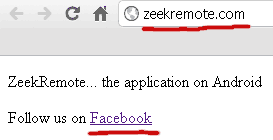
The domain ‘zeekremote.com’ is registered to a ‘Jean Gaudreau’. The Zeek Remote website currently contains nothing more than a link to a Facebook group.
On this Facebook group (which currently has 144 members), published just four days ago by a ‘Eurico Alves’ is a file labelled Presentation Zeek Rewards in English’:
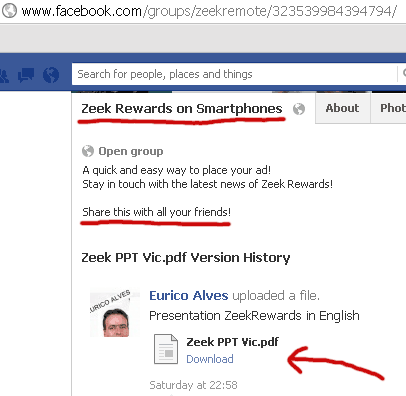
The Presentation is a series of slides designed to recruit new affiliates into Zeek Rewards. Sure enough on pages 23 and 24 of the presentation are screenshots of an unnamed affiliate’s backoffice, along with highlighted daily ROI averages (note I haven’t added anything to the slides, they are presented as is):
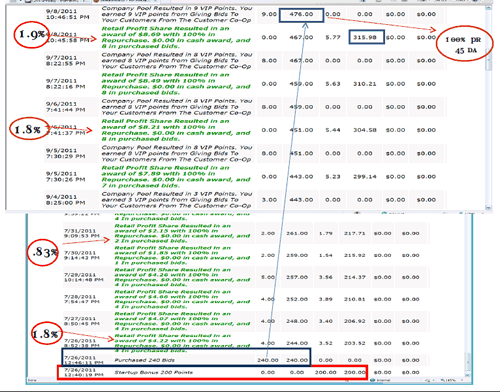
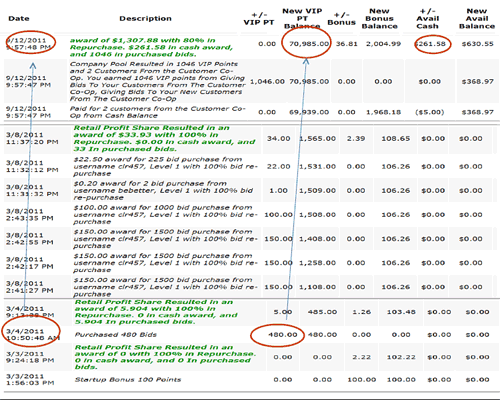
When you look at the history of Zeek Rewards and dubiousness with which Zeek Rewards management marketed the opportunity to new affiliates, is it really all that surprising that members with just under 80,000 VIP point balances who most likely joined early on are still advertising Zeek this way?
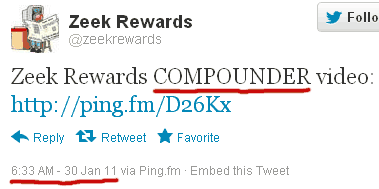
Let’s face it, whether you’re guaranteeing a 125% ROI or a 90 day ROI, fundamentally you still need to be paying out >100% than the money your members are paying in, however you want to dress up these payments (VIP bid purchases, retail bids via dummy customers, compounding bid purchases etc.), otherwise people aren’t going to keep injecting new money into your scheme.
At their May Red Carpet event it was announced that Zeek Rewards had roughly doubled their affiliate account and exceeded affiliate membership of over 700,000. I’m not aware of what the current membership count is but sooner or later it’ll slow down and coupled with everyone’s point balances continually growing… someone has to be left holding the bag at the end.
Of course it won’t be company management, with their executive status within Zeek Rewards and the access it brings, they’ll be able to spot a decline in new money a mile away and adjust their “withdrawal strategy” accordingly.
Footnote: The Darryl Douglas 26th January 2011 official Zeek Rewards marketing call can be streamed or downloaded directly from the Zeek Rewards website (click the image below, link working January 26th, 2011 – June 19th, 2012):
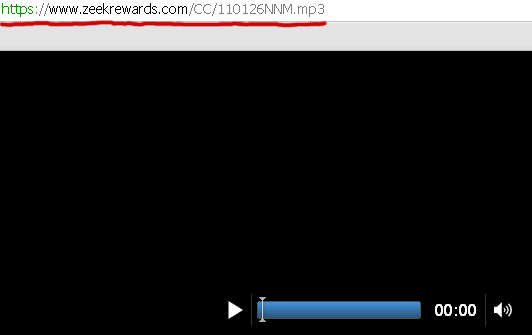
Update 21st June 2012 – Within 48 hours of this article going live Zeek Rewards nuked the above back office call, despite it being available for over a year prior.
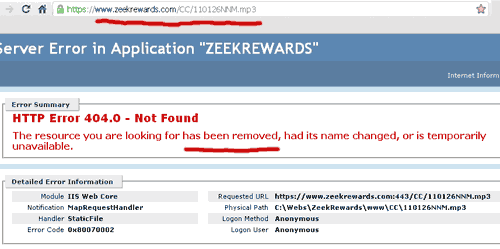
Here’s an alternative mirror:


If he’s cousin to Brandy I’m nephew to Amy Tan. Wait, I really am! 😀 (very distant relations, so distant, the other side had NEVER HEARD OF YOU!)
The compliance is looking more and more like whitewashing instead of real compliance review. The whole business model passes all four parts of the Howey Test, either before or after. Thus, it *is* an investment.
All this talk of “not an investment”? Whitewashing at best, outright fraud at worst. ANY SORT OF “enforcement” against people talking about ZeekRewards as an investment would be reinforcing a fraudulent representation.
Much like Madoff threaten to kick off the investors who invested with him, eh?
The amazing part is how similar ZeekRewards is to the illegal Ponzi “Ad Surf Daily”, and nobody picked up on it.
* It has now many of the top Ad Surf Daily Ponzi players… Hoy, Disner, Wright, Napier, Gilmond…
* Its business model is almost exactly like ASD
Just read this Federal indictment of ASD:
http://www.justice.gov/usao/dc/programs/vw/pdf/adsurfdaily_Bowdoin_Indictment_FILED_Nov_23_2010.pdf
If you substitute a few words, it reads EXACTLY like ZeekRewards.
Almost. Zeek Rewards reads slightly different:
Just have to say great article – it brings together lots of information to prove that Zeek’s stripes have always been those of an investment scheme.
I would add that even though they switched to 90 day points expiration in Aug 2011, they didn’t ban the use of the word ‘compund’, ‘interest’, ‘investment’, and other banking terms until Dec 2012. The move in Aug 2011 was likely because Nehra told Burks that it was an obvious investment scheme (reads just like any other HYIP or AdSurf).
They later realized that changing to the points structure didn’t matter when the top affiliates such as Todd Disner had YouTube videos showing 700k points (in 2011). So while the lawyers tried to disguise the investment scheme, they haven’t done anything to mask the Ponzi. It is plain as day operating as a Ponzi.
That back office has 80k points but it is likely much higher now. Imagine hundreds to thousands of people with 6 figure points. They can’t grow the new inbound affiliate income fast enough. This Ponzi will collapse due to its own growth.
I thought Dooley was going to get back on this forum and answer the tough questions after he was done traveling? Troy are you still traveling? We’re waiting!
The 125% ROI is very misleading when this darryl Douglas guy explains it. An ROI constitutes a return from a principal amount that generates income IN ADDITION to receiving back the initial “investment.”
This sleeze ball, Douglas, is describing a 25% ROI from his compounding scheme but saying 125%. His example sounds as if he pays you 125% of the POINTS/credits you have in your account. So you will earn your initial bid purchase back, plus 25% of whatever it was after 90 days if you always cash out.
That is a prime example given in the presentations. A chart is shown comparing two $1000 point values. One of them is cashing out every day and the other is compounding. The cash out options shows $14 a day for 90 days for a grand total of $1260(125%). The other shows the compounding method and projects points after two years.
yes, the $1260 is 125% of your account balance but not a 125% ROI. you would need earn $2250 for a 125%, which is your intial $1000 plus another $1250(125%)
Looks like another amateur hour at a MLM scheme. Top management doesn’t even know how to explain the return.
Another, but fallacious, bad sign: COO of a $100+ million company showing up to interview a MAJOR figure in the industry wearing a F***ing blanket. (DAWN W O, and Troy Dooly)
@Oz, but it’s not an investment! 😀 (fix that last sentence)
and again…This is some very hard hitting reporting going on here.
I hope more people pay attention and get out… if they can. At least “bid” on a bunch of product as to get something for the money and time.
I think that just speaks to their unprofessionalism. If you look at all the complaints members have of not being paid, support tickets unanswered and then cancelled, being placed on hold for hours and then disconnected, emails gone unanswered, voice messages ignored or voicemail inboxes full so no messages can be left, members not being credited with purchases, and member accounts being deleted entirely on occasion, they apparently just don’t give a s–t.
I do know that if I ran my business this way, I’d be out of business in a hurry.
Thanks Oz. It was like a stroll down memory lane.
Zeek’Now that non-industry reporters are pursuing the Zeek story, one of you should contact the reporter here and get them to ask the tough questions that the current “insiders” will not:
Its interesting to note that their is another penny auction that is #1 right now making hand over fist mad mad money and your saying that the only money coming into zeek is from the affiliates.
With over 3 million zeek players world wide a day bidding on stuff I figured out that with the 800,000 people in zeek, if the company had to pay out 80,000,000 a day that would mean each person would have to spend 26.67 on bids, thats not unreasonable, plus whatever money they do make from the store thats been around for a long time.
Everything starts from somewhere. I hope it does prove to last many years even if it is a pain sometimes. and the payouts can always keep shrinking in % a day.
I would like to see them put a hold on people coming in til the end of the year to see what effect it has on the system. most people I know start with 0-100.00 so that dont pay a whole lot of people up line.
Yeah I’m gunna stop you right there.
Three million, where’d you pull that number from? And if true, the only reason there’s three million customers is because affiliates are creating/buying dummy accounts left right and centre. Claiming 3 million customers = automatic profit is misrepresenting the Zeekler customerbase.
How many of those customers used their own money to purchase bids (non-affiliate money)?
Furthermore when you consider the commission liabilities Zeek Rewards have to pay out on each bid purchased in Zeekler, it’s easy to see that 3 million Zeekler customers, even if they were all 100% legit is not the same as 3 million regular penny auction customers.
There’s a reason Paul Burks was specific in stating that Zeekler was the world #2 penny auction in traffic and not profit (revenue doesn’t count, they have to cough up >100% of the cost price of each bid back through Zeek Rewards):
http://www.digtriad.com/news/article/232816/57/Latest-Bidding-Craze-Based-In-Lexington
@Jimmy
Before it gets taken out of context, at 2:50 the reporter states:
The report is about the penny auction side of the business. “It” is solely referring to penny auctions and not Zeek Rewards’ business model, which is what is being analysed and discussed here.
This is further clarified in the accompanying written report, which states:
“This operation” is referring to Zeek Rewards’ business model and the relationship between Zeekler and Zeek Rewards – that’s what counts (we already knew penny auctions themselves weren’t currently illegal in the US).
How are you interpreting “It” to refer solely to the penny auctions and not the Zeek Rewards business model, when the reporter specifically said (bold for emphasis):
Based on that report, I don’t think anything needs to be taken out of context to conclude that the North Carolina Attorney General’s office believes Zeekler as well as Zeek Rewards is legal.
As for the written report: I read that this morning soon after it was published. The last line of the report stated the same as the video report (that it is legal). Later in the day however, I noticed that the written report had been edited as you correctly cited above.
The report was about penny auctions citing Zeekler as a local example. It wasn’t about Zeek Rewards and the MLM business model.
Here’s the opening paragraph:
And the video segment opens with the anchor referring to a “penny auction craze”.
Penny auctions are currently legal in the US. Maybe they’ll do a followup in more detail specifically going over Zeekler/Zeek Rewards maybe not.
Furthermore “it” is singular, referring to penny auctions, not two seperate companies and/or the MLM business models. Also there’s a segment at the end about addiction and gambling, again reaffirming the story was on penny auctions.
The reason I mentioned ‘out of context’ because I can see it being used as a marketing point by affiliates:
‘The NC AG said we’re (Zeek Rewards) legal! Invest, invest invest!’
When the AG hasn’t stated anything specific about the whole compounder/VIP point investment scheme behind Zeek Rewards.
On the other hand, nothing will get the AG actually going over Zeek Rewards’ compensation plan faster than a few hundred thousand affiliates running around the internet claiming the North Carolina Attorney-General’s Office said Zeek Rewards is legal…
In any case I’ve sent off an email for clarification on the report from the NC AG Office (maybe someone in the US can contact them by phone?). If I hear anything back I’ll update.
Thanks, though I think it’s fair to assume that at this point, the North Carolina AG’s office doesn’t have a problem with Zeekler or Zeek Rewards. Obviously both are on their radar, as evidenced by the complaints they said they’ve received:
Yet, “it” is legal. Even if we assume that “it” refers simply to penny auctions in general, I doubt they would utter the word “legal” in connection with a company that is otherwise suspect. After all, they’re both under the Rex Ventures Group umbrella, as I’m sure the AG knows.
Wholly agreed.
They didn’t actually go into any detail specifically with Zeekler/Zeek Rewards, rather just explained a typical penny auction and cited Zeekler as an example (and got Burks to explain how their particular penny auctions work).
The reporter did a bit of explaining with the whiteboard and the thrust of the piece was on whether or not penny auctions were legal, with the AG clarification being presented right at the end, almost “thrown away” as I originally noted.
They definitely could have chosen a less ambigious way to say it though… or maybe that was done intentionally.
Same thing Troy Dooly did, explaining the penny auction model as legal and all that, without going into the MLM side at all, perhaps?
Well that didn’t take long:
That’s the second comment left, the first merely proclaimed the North Carolina Attorney-General’s Office had said Zeek Rewards was legal with a link to the WFMY news article (both were left on another article not this one).
Precisely the misrepresentation by affiliates I was pre-emptively addressing.
Precisely the “it’s legal until they say it ain’t” argument which I already addressed.
The question and the answer was not precise: what exactly was referred to by “It’s legal”? As the subject was penny auctions, as Oz said, clearly the “it’s legal” was referring to Zeekler.
Not that anybody bothered to ask why did Zeek operated for well over a year without a license (almost 2 years in fact), and only got an auction license in March 2012.
Not that the reporter asked any questions about ZeekRewards’ business model.
But no, Zeek affiliates are quick to presume “it’s legal” means the ENTIRE Rex Venture Group must be absolutely legal and will NEVER be prosecuted for ANYTHING!
Clearly, it’s “it’s legal until it ain’t”. And that’s a fallacy.
http://amlmskeptic.blogspot.com/2012/06/its-legal-until-they-catch-us-argument.html
Speaking of which, Ted Nuyten never got back to me from last week. I sent him a link to my hub and never heard from him since. I’m going to give him another 24 hours then I’ll ask him.
You don’t know that for sure?
North Carolina shows an auction license from March 2012, but we don’t know anything about the system they use for licenses. If an auction license lasts for a year, the new license can have replaced old ones in the registry.
So they CAN have had a license in 2010, which has been “overwritten” by a license in 2011, which has been “overwritten” by a license in 2012, which will be replaced by a new license in March 2013.
North Carolina Attorney General’s office refutes TV station statement that they have pronounced Zeek to be legal. The video report has disappeared from the station website.
http://www.patrickpretty.com/2012/06/20/bulletin-north-carolina-attorney-generals-office-refutes-suggestion-that-zeek-has-been-deemed-legal-we-do-have-concerns-agency-says-tv-station-removes-video-zeek-was-linking-to-on-its-bl/
This is the exact reply from the NC Auction Board:
So no, I can’t “confirm”, but I find it hard to interpret this reply in any other way.
I queried NC Auction board if there is any sort of penalty for a) running auction without a license, and b) failure to identify oneself as holder of such a license, they never got back to me.
Wow!
Wow!
I partly suspected the TV-report for being a paid “news story”, directly or indirectly. I spent more than half an hour on their website, reading about the different advertising solutions and other stuff.
The TV-station is the local TV-station in the same area as Lexington, the Piedmont Triad area. The program seemed to have been tailor made for Zeek.
“When something is too good to be true …” then it’s probably someone who has paid for it to look that good.
Got a query from a reader that one of his friends from Korea (I presume South Korea) was denied signup, with the reason give that Zeek don’t do business with South Korea. Any one can confirm or deny this?
South Korea is not on the list of countries.
The accepted countries are (trying to do this while minimizing use of vertical space):
Was it NEVER there, or was it removed recently?
Wait, “Republic of Korea” is in there…
False alarm. The guy was talking about a CC transaction that was automatically bounced by the bank as it was labelled as coming from Korea, which is one of those “mislabeled” transactions Zeek kept harping about.
Cash auctions are running on Zeekler.
For those doubting that Zeek ever advertised itself as an investment prior to Aug 2011 (apparently some are still claiming there is no proof), not only does Oz provided proof above, you can just ask the master of evidence preserver, Google. Search for this:
“zeek rewards 125%”
You will see that Google’s index still contains the 125% language and words such as “compounding” in Zeek’s own FAQ and AboutUs pages.
There also remains a ton of other sites promoting Zeek. If you were to judge a business by the company it keeps, check out this site: http://money4wealth.weebly.com/zeekrewards.html
The above site not only has the original Zeek Rewards examples of 1.5 to 2% daily and 125% ROI, use of clear investment language such as “compounding daily”, but it also has advertise a Who’s Who of current HYIP/Ponzi schemes.
When you look at Zeek’s history, the company it keeps as far as top affiliates from ASD and other Ponzis, and the company it keeps with high risk eWallet providers, offshore credit card processing using multiple third party businesses, and murky banking and cashflow information shared to date, how can one not see giant, huge, glow-in-the-dark RED FLAG with a Vegas volcano spewing red lava out of the top?
Their view is obscured by the dollar signs in their eyes.
@Joe Mama: reminds me of this cartoon I translated from a Chinese anti-scam website:
http://s4.hubimg.com/u/3653843_f520.jpg
When a company stop sending out checks, why does that make a company bad? It doesn’t make sense to me. It still coming out from a bank.
Because the company is being deceptive about WHY it cannot send checks anymore. It is claiming “growing pains” and that it is too large so it needs to “go paperless”.
The reality is any company would much rather use checks than deal with the eWallet issues – nuermous hassles, customer support pains, affiliates not getting paid, fees charged to both parties constantly.
But Zeek lost its banking relationships and had to force all affiliates to cash their checks by June 1. Some affiliates hadn’t even received their checks yet and are waiting weeks for customer support to reissue, with no response after creating a ticket.
Zeek was FORCED to “go paperless” because its banking transactions at the time were too high risk. Whether Zeek can mitigate that high risk with its current scheme of offset credit card processors and eWallet juggling is to be seen.
What made it a high risk to begin with
But if they go offshore then couldn’t they bring back checks
Total speculation on my part, but with regards to payroll, I’d venture to guess that what’s ahead will be something like payments via mandatory prepaid Canadian debit cards with a $14.95 registration fee and a $4.95 monthly maintenance fee, and a 4% cash advance fee to actually get cash… not to mention any currency exchange fees that may apply. Something along these lines…
So, the question is when and how does this hot mess end? I have 2 friends that are in this. One is on the plus principal side and the other has 90 days to go.
Is it any different that running a momentum stock in the Market? Is it any different than the Housing Bubble? Last person please sweep up.
I wouldn’t give it very long, myself. There are two ways a ponzi collapses: Incoming cash flow dries up, or people start cashing out en masse.
Even if the authorities don’t step in by August as predicted by other commenters here, with all the payment problems they’re having they’re going to have a hard time getting new people to sign up and people already in Zeek will all want to cash out after having payment problems and hearing of other affiliates’ payment problems.
ive been in zeek for 362 days with $10.000 inital investment and am cashing out at 80-20 $172000 in account at this time and pulling out$3600 a week.
have already gotten 4 payments in a row and dont anticipae any problems
Pulling $3,600 out of a scheme mostly funded by new affiliate money, and you ‘dont anticipa any problems’?
Riiiiiiiiiiiiiiiiiight.
Im curious,
Its apparent that companies like zeekrewards has potential to grow plus give its new members(affiliates) an opportunity to transition their own lives, which is the motive, would”nt you agree? Regular people trying to exceed past their own financial expectations, seems to be the consensus amongst all its members.
Yet pitfalls and deep research into so called, “Ponzi schemes” and “Risky payouts”, certainly put a damper on those who are already “Knee Deep” into the program ,willingly, or those who are considering joining.
My point is, there is a lot of negative output in and around ZeekRewards and even though you speculate that its projected demise will end this month, do you see anything positive in this program whatsoever? Just curious to know.
Mr. Blue Collar
@YingYang
Irrelevant when we’re talking about a Ponzi scheme.
There’s nothing positive about a business model that will eventually leave people holding the bag when it implodes due to mathematical sustainability problems.